Text
20 important study skills/tips i’ve learned from my professors
1. start studying a week before every quiz/test. seriously.
2. watch youtube videos/ted talks on the topics you are learning about.
3. get lots of sleep! sleep helps you process the day’s events, including what you learned.
4. write out your notes. it’s proven that handwritten notes help you learn better than typed out notes.
5. don’t just read what your professor gives you. find academic journals, books, etc. that correspond with your subjects.
6. read the news! especially in the social sciences/humanities, connecting concepts with current events helps you understand and process more easily.
7. exercise! this doesn’t have to be going on runs or lifting weights, it could even just be going for a 20 minute walk. just get your blood pumping, it’ll help you focus.
8. study at your desk. it may be tempting to study in bed, but your brain connects your bed with sleep, so you’ll get tired more quickly.
9. reviewing notes doesn’t have to be something you sit down and do for an hour. skim through them and test your memory while eating breakfast!
10. expand your study time throughout the day to avoid burnout. for example, rather than studying for 5 hours straight, study for an hour here and there in between your activities.
11. make your notes organized and easy to read, but not distracting. bright colors and flashy notes may seem better, but can sometimes distract from the purpose of the notes.
12. use apps such as quizlet. this way, you can go through definitions while waiting in lines or walking to class.
13. it’s more important to know concepts rather than facts. for example, you should be able to take what you know and apply it to different situations, not just the situation the textbook gives you.
14. just because the professor doesn’t require you to read textbook, doesn’t mean you shouldn’t. it helps explain concepts in a different way than your professor, and a lot of times hearing two different explanations for the same concept helps you understand it.
15. read in advance. read the textbook before your professor begins going over the chapter, so when he/she does, you can easily follow what they are saying.
16. do any extra credit work that comes your way. even if you don’t need the extra boost now, you might later.
17. go to class!! if you always skip class and show up at office hours completely lost on the concepts, they’ll laugh in your face. they’ll take you 100x more seriously if you show up.
18. however, if you are sick, take a day off. it’s more beneficial to you in the long run.
19. learn how to say “no”. if you have an 8 am the next day, don’t stay out until midnight with your friends.
20. don’t stress too hard over quizzes. if you expect them to go horribly, they will. you got this.
35K notes
·
View notes
Text
There is literally nothing in nature that blooms all year long, so do not expect yourself to do so.
1M notes
·
View notes
Text

heyy! with school starting again, I decided to combine a lot of helpful post, so you can rock the new school year! I’ve spent quite some time going through different masterposts and the ones i included here are very helpful resources. good luck for the new school year! <3
STUDYING
study effectively
revise method
take a break
study journal
planning the perfect study schedule
all the things that got me studying after one year of living through tv-show characters and wasting time on youtube (be honest, we all need this)
how to memorize
flashcards
preparing for exams
how to pull an all-nighter (but pls only do this in extreme situations)
how i study
SCHOOL
how to wear what you want to school
first day of class
emergency kit
list of tips (this is super helpful)
test taking tips
help! i hate my teacher
how to annotate
NOTE TAKING
how to take notes from a textbook
tips
what to do when you ruined your notes
upgrade your notes
ESSAYS
five paragraph essay
how to write 20 pages
battling essays
STATIONERY
essentials
backpack buying guide
cute and cheap stationery
LANGUAGES
tips + resources
different ways to learn a language
how to learn a language by doing nothing
SELF CARE / PERSONAL
self care
some advice
back to school glow up
morning routine
night routine
skin care
stress route
mental health tips
school and heartbreak
tests for when you don’t know what to do with your life
burnout - a guide for students
FOOD
study foods
ideas
easy recipes for students
ORGANIZATION
organize & refresh your phone and laptop https://youtu.be/3b00aqUqoZI
staying organized
guide to bullet journals
bujo for students
PRODUCTIVITY
beat procrastination
how to increase productivity
sort out tasks
self-discipline
MOTIVATION
study moods
motivation
gentle reminder
how to motivate yourself to start studying
MUSIC
mildliner inspired study playlists
best spotify playlists and albums for your study session
playlists for different moods
study music
PRINTABLES
binder covers
grade tracker
study pack (task tracker, formula list, habit tracker, task tracker)
go to sleep
back to school kit (class data, study group sheet, supplies list)
APPS
google chrome extensions
my favorite study apps
apps for students
10K notes
·
View notes
Photo

adapted from this response
1. Write your notes in a way where you can test your retention and understanding.
Many people write notes that do a great job summarizing their materials but their notes are not designed to promote learning, retention or diagnosis of their weaknesses. But my notes can – and so can yours.
Simply put my notes can be used like flashcards because I write them in a form where I separate a “stimulus” from a “response.” The stimulus are cues or questions (think: front side of flashcard), while the response is the answer to the cue (think: back of flashcard). But the stimuli are to the left of a margin, while the responses are to the right. The key advantage of this is that just by putting a sheet of paper on top of your notes, you can hide the responses, while leaving the stimuli visible. You can have multiple margins and multiple levels of stimuli and response for greater information density. When you get good at this you can write notes in this form in real-time. To get some idea of what I’m talking about google for “Cornell Notetaking method”. My notetaking method is a variant of this. I usually use completely blank paper to do this because regular lined paper has too small a margin.
To give you an idea of how powerful this notetaking method can be, I learned several courses just hours before the exam and still got an “A” in all of them during a difficult semester where I had too many competing priorities to spend long hours studying. Had it not been for this notetaking method I don’t think that would be possible.
2. Develop the ability to become an active reader (this is the perhaps the most important advice I have to share).
Don’t just passively read material you are given. But pose questions, develop hypotheses and actively test them as you read through the material. I think the hypotheses are part of what another poster referred to when he advised that you should develop a “mental model” of whatever concept they are teaching you. But a mental model can be much more than simple hypotheses. Sometimes the model resembles a story. Other times it looks more like a diagram.
But what they all have in common is that the explain what is going on.
Having a mental model will give you the intuition and ability to answer a wider range of questions than would be otherwise possible if you lacked such a mental model.
Where do you get this model? You creatively develop one as you are reading to try to explain the facts as they are presented to you. It’s like guessing how the plot of a movie, before it unfolds.
Sometimes you have to guess the model based on scarce evidence. Sometimes it is handed to you. If your model is a good one it should at least be able to explain what you are reading.
Having a model also allows you to make predictions which can then be used to identify if your model is wrong. This allows you to be hypersensitive to disconfirming evidence that can quickly identify if your model is wrong.
Oftentimes you may have two or more models that can explain the evidence, so your task will be to quickly formulate questions that can prove one model while disconfirming the others. To save yourself time, I suggest focusing on raising questions that could confirm/disprove the mostly likely model while disproving the others (think: differential diagnoses in medicine).
But once you have such a model that (i) explains the evidence and (ii) passes all the disconfirming tests you can throw at it then you have something you can interpolate and extrapolate from to answer far more than was initially explained to you.
Such models also make retention easier because you only need to remember the model as opposed to the endless array of facts it explains. But perhaps more importantly, such models give you intuition.
Of course, your model could be wrong, but that is why you actively test it as you are reading, and adjust as necessary. Think of this process as the scientific method being applied by you, to try to discover the truth as best you can.
Sometimes you will still be left with contradictions that even your best models cannot explain. I often found speaking to the professor after class to be a time efficient of resolving these contradictions.
I discovered mental modelling as a survival mechanism to pass my studies at the University of Waterloo – where their teaching philosophy is misnomer because their teaching philosophy is to not teach as well as they could.
You can see this from their grading philosophy. Although they don’t use a bell curve or other statistical grade adjustment, they make their exams so hard that the class average is usually between 68 (C+) and 72 (B-) in spite of the fact that their minimum admission grades are among the highest in Canada (you need more than A+ to get into several of their engineering programs).
The only way they can achieve such low test averages from otherwise high performing students is by holding back some of what they know, and then testing what they didn’t explain well in lecture on their exams; or by not teaching to the best of their ability.
This forces students to develop the ability to teach themselves, often from materials that do not explain things well, or lack the introductory background knowledge needed to understand the material.
I realized I could defend against such tactics by reverse engineering the results into theories that would produce those same results; i.e. mental model induced from scarce facts.
Then when I got to MIT I found myself in a place with the opposite teaching philosophy. Unlike Waterloo, if the whole class got an “A” the MIT professors would be happy and proud (whereas at Waterloo an “A” class average would be the cause for a professor’s reprimand).
The mental modelling skills I developed at Waterloo definitely came in handy at graduate school because they enabled me to learn rapidly with scarce information.
3. Be of service to your fellow classmates.
I’ve personally observed and heard anecdotal stories that many students in highly competitive programs are reluctant to share what they know with their peers; a good example being the vast number of students in a top ranked science programs competing for the very few coveted spots in med school. I’ve seen people in such situations be afraid to share what they know because the fear it could lead to the other students “getting ahead” while leaving them behind. I would actually recommend doing the opposite: share liberally. You can’t expect help from others if you are unwilling to help others yourself.
I spent hours tutoring people in subjects I was strong in. But, conversely those same people were usually happy to help me with my weaknesses when I needed it. I also found it easier to get good teammates – which is essential to getting good grades in team-based classes. I found I learned a LOT from other people. And their questions helped me to prepare for questions I may not have thought of – some of which would appear on the exams.
4. Understand how the professor grades.
Like the real world, the academic world is not always fair. You need to understand who is grading you and what they are looking for. Oddly, if you actually answer questions as written, you won’t get full marks from some teachers. Some professors expected more than the answer. Some only accepted the answers taught in class as opposed to other factually correct answers – which coincidentally can easily happen if you rely heavily on mental models. Some expected you to not even evaluate whether the answers to their multiple choice answers were true or not; only to notice which answer choices aligned or did not align with the theories taught in class. Some highly value participation in which case you ought to have a mental model of what they are teaching based on their assigned readings. The sooner you know who you are dealing with, the sooner you can adjust to their way of grading. Thankfully I considered the vast majority of my professors to have graded in a fair manner.
5. Get involved in research while still in undergrad.
Academics is a means to an end. To me that end was “solving problems” and “building stuff” specifically systems and organizations. Depending on the school you apply for, your research may be just as important, if not more important, than your grades. In fact if all you have are good grades your chances of getting into a top ranked CS program with a research component (e.g. MIT, CMU) are slim to nil; though you might still be able to get into a top-ranked courseware-based Masters (such as Stanford where there is no masters thesis).
I did an Artificial Intelligence research project in undergrad and posted it on the internet. Not long after it was cited in three patents from IBM, AOL and another inventor. Then 40 other people cited my work. I feel this helped me get into MIT because they saw that I could come up with theories with practical applications. It also led to internships with top research teams whose work I am still in awe of. This research also helped my graduate application. None of this would have been possible if I didn’t do research in undergrad.
6. Attend classes.
I do not understand the students who claim they did well without attending class. Many professors will only say certain things in class. Many classes only present some of the material in class. If you don’t attend class you simply won’t get that material. You also won’t be able to ask immediate follow-up questions. I also found speaking to the professor after class was an efficient way to resolve contradictions I had found with my mental model.
7. Time management is key – especially in undergrad.
In my competitive undergrad program I once learned that a friend who achieved top 5% status actually timed how long he ate.
While I do not suggest going to such extremes I offer this modest advice. I suggest spending no more than 30 minutes trying to solve a problem you can’t solve by yourself before appealing to office hours or another knowledgeable student. I also suggest you ask questions of your professor during or after class as opposed to leaving the class confused. This reduces wasted time in an environment when time is a very precious commodity.
8. Going out and having fun is conducive to good grades.
In my early undergrad years I studied as hard as I could. And I thought this meant putting in as many studying hours as possible. But I later realized that going out and having fun refreshed the mind and increased grades. Unfortunately it took at least 2 years for me to understand this lesson.
9. Learn how to do advanced Google searches.
This is an essential skill that enables you to answer your own questions, quickly. At a minimum I suggest you learn how to use the following Google search operators ~, -,*, AND,OR, and numeric ranges via the double dot (“..”) operator. The “site:” operator is also often helpful. I also found adding the word “tutorial” to a Google search often yields great introductory materials.
10. Turn weaknesses into strengths.
While studying for standardized exams I learned the importance of addressing one’s weaknesses as opposed to ignoring them. If you make a mistake on a question, it is because of a weakness within you. If you do not address that weakness it will follow you to the exam.
I learned this lesson when studying for standardized exams. I was able to legally buy 30 old exams and thought the best approach to studying for the exam was to do as many old problems as possible. But as I completed each exam I kept getting the same score (+/- 5%) over and over. I had plateaued!
But then I made a tiny tweak and my scores kept going up. Specifically, after each old exam, I would identify my weaknesses that led to each wrong answer, prioritize the weaknesses according to the degree to which they affected my score, and would address them in that order. When I did that, my scores increased steadily all the way to the highest possible percentile (99%).
I later realized that such standardized tests are designed to provide consistent scores (if the student does not study in between the subsequent exams to address their weaknesses). In fact that is one of the statistical measures used to measure the quality of a standardized exam and it’s called “Reliability” (Google for “psychometric reliability” to see what I’m talking about).
31K notes
·
View notes
Text
Questions you should ask yourself the night before a test

We’ve all experienced test anxiety and it ain’t pretty at all, so here’s some questions which would help you calm down a little before the exam and maybe get some revision done too!
The night before your exam, make a list of these questions and try to answer them and work on stuff you need to :
Have I solved the textbook exercise problems/questions?
Have I checked my class notes and noted all points the teacher marked as important and likely to appear in the paper?
Have I taken at least 1 practice test for this chap/subject?
Am I getting enough time to sleep before the test?
Do I have my supplies ready?
Is my water bottle filled and my stomach full?
Am I hungry?
Am I confident that I can ace this test?
If not, what can I do to get a little better grade than what I’m expecting rn?
Is this topic important enough to be covered in an exam?
Did I go through my notes for this topic?
Do I understand the topics that will be asked in this test?
What kind of test if this (MCQs, theory, solving, etc)?
Am I prepared for that type of test?
Is there any way to get better at this particular test type?
How important will this exam be for my overall result?
Do I absolutely, really need to pull an all nighter for this test?
Have I gone through the textbook?
And lastly, does this exam define me as a human? Nope. It doesn’t. So don’t fret a lot okay?
Anyway this is a short list you can go through to help you ease your mind. Have fun and good luck on that test!
1K notes
·
View notes
Video
instagram
spacebohemians [Starry Eyes’ Japan trip]
Starry-Eyed Lee and Starry-Eyed Kim’s trip to Japan 🕺🕺
We will soon bring you good news!
#WaitJustALittleWhile #NELL #SPACEBOHEMIAN
#StarryEyesLee #StarryEyesKim #JapanTrip #LeeJunghoon #KimJongwan #tokyo
11 notes
·
View notes
Text
50 Top Online Learning Sites

Rejoice fellow uni students looking for some studyspo, we urge you to take a few free lessons, as well as academic lessons provided from actual universities on several topics. Have a look at the 50 top learning sites you can find online to help you save some time.
Art and Music
Dave Conservatoire — Dave Conservatoire is an entirely free online music school offering a self-proclaimed “world-class music education for everyone,” and providing video lessons and practice tests.
Drawspace — If you want to learn to draw or improve your technique, Drawspace has free and paid self-study as well as interactive, instructor-led lessons.
Justin Guitar — The Justin Guitar site boasts over 800 free guitar lessons which cover transcribing, scales, arpeggios, ear training, chords, recording tech and guitar gear, and also offers a variety of premium paid mobile apps and content (books/ ebooks, DVDs, downloads).
Math, Data Science and Engineering
Codecademy — Codecademy offers data science and software programming (mostly Web-related) courses for various ages groups, with an in-browser coding console for some offerings.
Stanford Engineering Everywhere — SEE/ Stanford Engineering Everywhere houses engineering (software and otherwise) classes that are free to students and educators, with materials that include course syllabi, lecture videos, homework, exams and more.
Big Data University — Big Data University covers Big Data analysis and data science via free and paid courses developed by teachers and professionals.
Better Explained — BetterExplained offers a big-picture-first approach to learning mathematics — often with visual explanations — whether for high school algebra or college-level calculus, statistics and other related topics.
Design, Web Design/ Development
HOW Design University — How Design University (How U) offers free and paid online lessons on graphic and interactive design, and has opportunities for those who would like to teach.
HTML Dog — HTML Dog is specifically focused on Web development tutorials for HTML, CSS and JavaScript coding skills.
Skillcrush — Skillcrush offers professional web design and development courses aimed at one who is interested in the field, regardless of their background — with short, easy-to-consume modules and a 3-month Career Blueprints to help students focus on their career priorities.
Hack Design — Hack Design, with the help of several dozen designers around the world, has put together a lesson plan of 50 units (each with one or more articles and/or videos) on design for Web, mobile apps and more by curating multiple valuable sources (blogs, books, games, videos, and tutorials) — all free of charge.
General – Children and Adults
Scratch – Imagine, Program, Share — Scratch from MIT is a causal creative learning site for children, which has projects that range from the solar system to paper planes to music synths and more.
Udemy — Udemy hosts mostly paid video tutorials in a wide range of general topics including personal development, design, marketing, lifestyle, photography, software, health, music, language, and more.
E-learning for kids — E-learning for Kids offers elementary school courses for children ages 5-12 that cover curriculum topic including math, science, computer, environment, health, language, life skills and others.
Ed2go — Ed2go aims their “affordable” online learning courses at adults, and partners with over 2,100 colleges and universities to offer this virtual but instructor-led training in multiple categories — with options for instructors who would like to participate.
GCF Learn Free — GCFLearnFree.org is a project of Goodwill Community Foundation and Goodwill Industries, targeting anyone look for modern skills, offering over 1,000 lessons and 125 tutorials available online at anytime, covering technology, computer software, reading, math, work and career and more.
Stack Exchange — StackExchange is one of several dozen Q+A sites covering multiple topics, including Stack Overflow, which is related to computer technology. Ask a targeted question, get answers from professional and enthusiast peers to improve what you already know about a topic.
HippoCampus — HippoCampus combines free video collections on 13 middle school through college subjects from NROC Project, STEMbite, Khan Academy, NM State Learning Games Lab and more, with free accounts for teachers.
Howcast — Howcast hosts casual video tutorials covering general topics on lifestyle, crafts, cooking, entertainment and more.
Memrise — Lessons on the Memrise (sounds like “memorize”) site include languages and other topics, and are presented on the principle that knowledge can be learned with gamification techniques, which reinforce concepts.
SchoolTube — SchoolTube is a video sharing platform for K-12 students and their educators, with registered users representing over 50,000 schools and a site offering of over half a million videos.
Instructables — Instructables is a hybrid learning site, offering free online text and video how-to instructions for mostly physical DIY (do-it-yourself) projects that cover various hands-on crafts, technology, recipes, game play accessories and more. (Costs lie in project materials only.)
creativeLIVE — CreativeLive has an interesting approach to workshops on creative and lifestyle topics (photography, art, music, design, people skills, entreprenurship, etc.), with live access typically offered free and on-demand access requiring purchase.
Do It Yourself — Do It Yourself (DIY) focuses on how-tos primarily for home improvement, with the occasional tips on lifestyle and crafts topics.
Adafruit Learning System — If you’re hooked by the Maker movement and want to learn how to make Arduino-based electronic gadgets, check out the free tutorials at Adafruit Learn site — and buy the necessary electronics kits and supplies from the main site.
Grovo — If you need to learn how to efficiently use a variety of Web applications for work, Grovo has paid (subscription, with free intros) video tutorials on best practices for hundreds of Web sites.
General College and University
edX — The edX site offers free subject matter from top universities, colleges and schools from around the world, including MIT and Harvard, and many courses are “verified,” offering a certificate of completion for a nominal minimum fee.
Cousera — Coursera is a learning site offering courses (free for audit) from over 100 partners — top universities from over 20 countries, as well as non-university partners — with verified certificates as a paid option, plus specializations, which group related courses together in a recommended sequence.
MIT Open Courseware — MIT OpenCourseWare is the project that started the OCW / Open Education Consortium [http://www.oeconsortium.org], launching in 2002 with the full content of 50 real MIT courses available online, and later including most of the MIT course curriculum — all for free — with hundreds of higher ed institutions joining in with their own OCW course materials later.
Open Yale Courses — Open Yale Courses (OYC) are free, open access, non-credit introductory courses recorded in Yale College’s classroom and available online in a number of digital formats.
Open Learning Initiative — Carnegie Mellon University’s (CMU’s) Open Learning Initiative (OLI) is course content (many open and free) intended for both students who want to learn and teachers/ institutions requiring teaching materials.
Khan Academy — Khan Academy is one of the early online learning sites, offering free learning resources for all ages on many subjects, and free tools for teachers and parents to monitor progress and coach students.
MIT Video — MITVideo offers over 12,000 talks/ lecture videos in over 100 channels that include math, architecture and planning, arts, chemistry, biological engineering, robotics, humanities and social sciences, physics and more.
Stanford Online — Stanford Online is a collection of free courses billed as “for anyone, anywhere, anytime” and which includes a wide array of topics that include human rights, language, writing, economics, statistics, physics, engineering, software, chemistry, and more.
Harvard Extension School: Open Learning Initiative — Harvard’s OLI (Open Learning Initiative) offers a selection of free video courses (taken from the edX selection) for the general public that covers a range of typical college topics, includings, Arts, History, Math, Statistics, Computer Science, and more.
Canvas Network — Canvas Network offers mostly free online courses source from numerous colleges and universities, with instructor-led video and text content and certificate options for select programs.
Quantum Physics Made Relatively Simple — Quantum Physics Made Relatively Simple” is, as the name implies, a set of just three lectures (plus intro) very specifically about Quantum Physics, form three presentations given by theoretical physicist Hans Bethe.
Open UW — Open UW is the umbrella initiative of several free online learning projects from the University of Washington, offered by their UW Online division, and including Coursera, edX and other channels.
UC San Diego Podcast Lectures — Podcast USCD, from UC San Diego, is a collection of audio and/or video podcasts of multi-subject university course lectures — some freely available, other only accessible by registered students.
University of the People — University of the People offers tuition-free online courses, with relatively small fees required only for certified degree programs (exam and processing fees).
NovoEd — NovoEd claims a range of mostly free “courses from thought leaders and distinguished professors from top universities,” and makes it possible for today’s participants to be tomorrow’s mentors in future courses.
IT and Software Development
Udacity — Udacity offers courses with paid certification and nanodegrees — with emphasis on skills desired by tech companies in Silicon Valley — mostly based on a monthly subscription, with access to course materials (print, videos) available for free.
Apple Developer Site — Apple Developer Center may be very specific in topics for lessons, but it’s a free source of documentation and tutorials for software developers who want to develop apps for iOS Mobile, Mac OS X desktop, and Safari Web apps.
Google Code — As with Apple Developer Center, Google Code is topic-narrow but a good source of documentation and tutorials for Android app development.
Code.org — Code.org is the home of the “Hour of Code” campaign, which is aimed at teachers and educators as well as students of all ages (4-104) who want to teach or learn, respectively, computer programming and do not know where to start.
Mozilla Developer Network — MDN (Mozilla Developer Network) offers learning resources — including links to offsite guides — and tutorials for Web development in HTML, CSS and JavaScript — whether you’re a beginner or an expert, and even if you’re not using Mozilla’s Firefox Web browser.
Learnable — Learnable by Sitepoint offers paid subscription access to an ebook library of content for computers and tablets, and nearly 5,000 videos lessons (and associated code samples) covering software-related topics – with quizzes and certification available.
Pluralsight — Pluralsight (previously PeepCode) offers paid tech and creative training content (over 3,700 courses and 130K video clips) for individuals, businesses and institutions that covers IT admin, programming, Web development, data visualization — as well as game design, 3D animation, and video editing through a partnership with Digital-Tutors.com, and additional software coding lessons through Codeschool.com.
CodeHS — CodeSchool offers software coding lessons (by subscription) for individuals who want to learn at home, or for students learning in a high school teacher-led class.
Aquent Gymnasium — Gymnasium offers a small but thorough set of free Web-related lesson plans for coding, design and user experience, but filters access by assessing the current knowledge of an enrollee and allows those with scores of at least 70% to continue.
30K notes
·
View notes
Text
ways to study for exams that are actually productive
use actual note cards for vocab. yes, apps like quizlet are dandy when you’re on the go, but actually physically writing out each note card helps put the information into memory faster than typing them.
visual learner? make charts and diagrams. they don’t have to be pretty. the lines don’t have to be perfectly straight. it doesn’t have to be photogenic. but if it helps you learn, do it.
after you take notes (in class or at home/from your text book), write down possible quiz questions about the material on the next page while it’s still fresh in your mind. later on when you’re studying for the test, use these questions to gauge what specifics out of that chapter you need to work on the most.
start sooner rather than later. i know, you’ve heard this a million times from every teacher ever. but it’s legit. especially as you get into harder level classes and college courses because there is literally so much material that the tests cover that you simply can not accurately learn all of it over night. instead, start about 10 days in advance (but of coarse, the sooner the better).
studying doesn’t have to be a big giant study session that takes hours. if you start far enough in advance, study sessions can be around an hour, hell even 45 minutes is a good. if you go too long in one study session your brain will be fried and studying will be pointless because your brain won’t be processing any of it. that’s why it’s important to take breaks and not just cram for 5 hours the night before an exam.
actually study. hold yourself accountable and make your education a priority. if you have homework and studying to do, make it a priority over going partying or watching tv. there will be another party. you can dvr your show. you can’t take your test on a later day because you don’t feel ready. so be ready.
be careful with study groups. if you have a study group with all of your best friends, lets face it, you’re going to end up spending more time talking about harry styles and supernatural than actually studying. it’s better to have a study group with people who are your friends, but not best friends. and it’s better to keep it between 5-7 people so that everyone can be involved.
if the material is just super confusing and you can’t seem to understand it no matter how hard you study, it’s not you. it’s the way you were taught it. each teacher teaches a bit differently, and maybe their style of teaching just isn’t for you. if this happens, find a way that explains it the best for you. for example, if chemistry is just super confusing for you, try watching the Crash Course chemistry videos on youtube or have a friend explain it to you. this will give you a completely different perspective on the material and will help you understand it better.
at the end of the day, remember that everything will be okay. studying can be stressful, especially if it’s in a class that you struggle in. but i promise you that you are not the only one who struggles sometimes in school, it’s a part of being human. as long as you actually put in an effort and try your best, be proud of yourself. take a deep breath. and remember: you got this.
24K notes
·
View notes
Text

Do you know these times when you’re sitting in front of your textbook, trying to learn these boring af vocabs you’ve seen 1000 times but still can’t remember and just wish to do something different (or hoping that the world explodes so you can at least stop)?
Well, there are more ways to learn a language and I think because we just learned how we “should” learn a language at school, we’re limited in creativity. Thanks to school it’s hard to think outside of this “textbook, vocab lists, tests, etc.” stuff but there are ENDLESS things you can do to learn a language.
Remember: everything you do in your native language, you can try to do in your target language!
This is for all the people who are tired and exhausted, who are thinking about quitting or don’t have fun with their target language anymore.
DON’T YOU DARE TO GIVE UP! YOU’VE COME SO FAR!
_____________________________________________
Examples for different ways of learning a language:
write a diary
summarise an article about a topic you like (cooking, fitness, etc.)
listen to a podcast/radio
listen to music (while reading the lyrics)
try to sing along with music
read out loud while reading a book/magazine/blog/etc.
watch movies/series/videos
record videos in your target language or about how studying is going (progress, problems, etc.)
write a blog (well hello there :))
use apps that make it more fun (duolingo, memrise, lingodeer)
chat with native speakers
actually talk to native speakers ( I know what a crazy idea)
read websites about things you’re interested in
use social media only available in your target language
change the language of your smartphone
change the language of your pc
change the language of your life
play games in your target language (like not necessarily for learning it, I mean just playing a normal game IN your target language)
take online lessons with teachers that make you forget you’re learning
do a challenge! (I love this one so much)
find a learning group
be active in forums (no matter about language learning or a forum in your target language)
find a language exchange partner. (You should, seriously.)
watch lessons on youtube
read a (children-)book (with audio)
talk to yourself
think in your target language (a fun way is to tell a story about your life while it’s happening like “I went down the road with a stranger always behind me, who could it be? What does he want? It got quite… too quite. I tried to keep calm but was it really a coincidence? All in the middle of nowhere?” I know I’m bad at this but I hope you get what I mean, think of it like reading a book.)
learn vocabs with pictures, type in the word you want to know and ONLY look for pictures, try to feel the word. If you google for “strawberry” (in your target language and don’t know what it means) look at the pictures, the colours, how could it smell? Make a sentence with the new word. When was the last time you ate it? How was it?
Write a story/book online or just for yourself.
Make a mindmap
Use a topic jar (a jar where you put in notes with different topics on it, you take one every day and write/talk about it)
use social media to find groups interested in learning a new language or your target language
translate texts and act like you’re a famous translator who’s the only person on earth who can translate your target language (for example if you’re reading articles about historical stuff, act like you’re the only one who can find out what happened back then and the whole world is counting on you!)
try to solve random online tests
listen to a song/audiobook/whatever and write down what you hear
search for words you want to learn and build up (funny!) sentences with them or even whole stories
read comics/mangas/etc.
search for receipts in your target language and pray to god you’re doing it right… if not, well you won’t forget the vocab again. Win-win situation. :p
search for language learning groups near your living place and actually meet them (stay safe and check everything before)
listen to children songs (I still remember the first children song I learned in English lessons… like… 11 years ago in 5th grade) these songs are supposed to stick… *cough* head shoulders knees and toes knees and toes *cough* sorry where was I?
connect with language learners over Skype (useful groups of course like German trying to learn French, Frenchman trying to learn Turkish, Turk trying to learn German)
write a list (you know… like I do right know so I don’t forget English)
describe things you see (more fun with a partner)
teach your target language to others
listen to audio while sleeping
take notes in your target language (I don’t mean for grammar rules or something like that, I mean notes you would take in your native language anyway)
write a letter (so much better than an e-mail)
write an e-mail (who has time for letters)
learn rimes
learn jokes (it’s also useful for social interaction)
talk to your pets (at least if they listen to you, if I start to talk to my cat she starts yelling into my face)
translate songs and learn the vocab of it so you have more fun listening to it later
think about a topic and write down every word you can think of and then translate them into your target language
10K notes
·
View notes
Text
Greek Alphabet
Α α = alpha
Β β = beta
Δ δ = delta
Ε ε = epsilon
Φ φ = phi
Γ γ = gamma
Η η = eta
Ι ι = iota
Ξ ξ = ksi
Κ κ = kappa
Λ λ = lambda
Μ μ = mu
Ν ν = nu
Ο ο = omicron
Π π = pi
Ρ ρ = rho
Σ σ = sigma
Τ τ = tau
Θ θ = theta
Ω ω = omega
Χ χ = chi
Υ υ = upsilon
Ζ ζ = zeta
Ψ ψ = psi
12K notes
·
View notes
Text
Magic hand made candles🕯🎀
Hello!💛 My hand made candles are on sale!
I made my candles by myself. Every candle is aromatic and with narural herbs. Every herb I collected by myself, so it makes my candles more natural, original and powerful.

I collected a lot of herbs, which I used in my candles.💖

Sage candle

Can be used for cleansing, healing, longevity, money, passion, prosperity rituals.
Orange flower candle

Brings optimism and success.
Bay laurel yellow candle

Can be used for money, love, success and cleansing rituals.
Dark blue Oregano candle

Candle can be used for love, happiness and protection rituals.
Aromatic roses candle

A good choice for love rituals.
Lavender candle

Candle cleans, heals, protects and brings peace.
Red aromatic candle

Candle can ve used for love rituals.

Visit my etsy to get my candles - www.etsy.com/shop/LevanderCandles
Every can is made with essential oil. More information and candles on my etsy.
Every candle is 150ml glass jar.
Every candle costs 8€.
Worldwide shipping -5€
I ship every candle from Germany so shiping for Germany costs 3€!
My instagram- @candles_witch
Blessed be!
Made with love.
Lavender 🎀
4K notes
·
View notes
Text
10 Traits that Lead to Success
1. Independence
2. Self-confidence
3. Persistence
4. Creative thinking
5. Being thick skinned
6. Knowing who you are and what you want from life
7. Setting clear goals – and going after them
8. Staying focused
9. Optimism
10. Passion and a zest for life.
2K notes
·
View notes
Text
lowkey lofi study playlist

verisons: spotify + youtube + soundcloud
*not all versions include all the same songs, but most are the same. most extensive version is spotify. perfect for studying, relaxing.
includes, but not limited to;
flowers ft. nori by in love with a ghost
lullaby by snail’s house
controlla by idealism
her by eery
viola by eevee
the girl next door by tomppabeats
how many stars are there by idealism
moon by mt. fujitive
bliss by jinsang
enjoy your listening!
316 notes
·
View notes
Photo
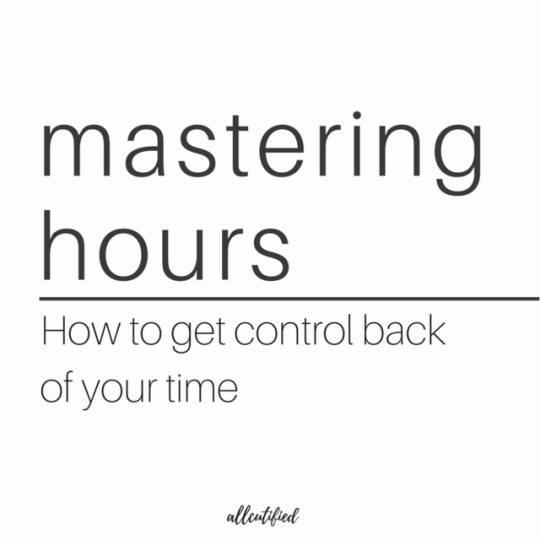
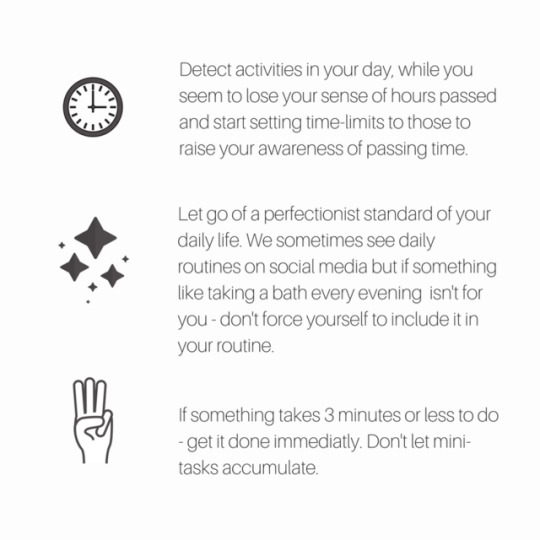

180318 // Ever asked yourself “Where has the day gone?”. Time is a matter of perception and we sometimes feel like just not getting the hang of time management. Here are some tips on how to get back control of your time in your daily life - or at least win back like a few hours.
6K notes
·
View notes
Photo
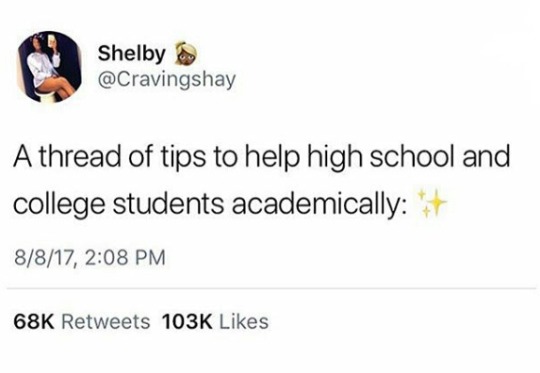
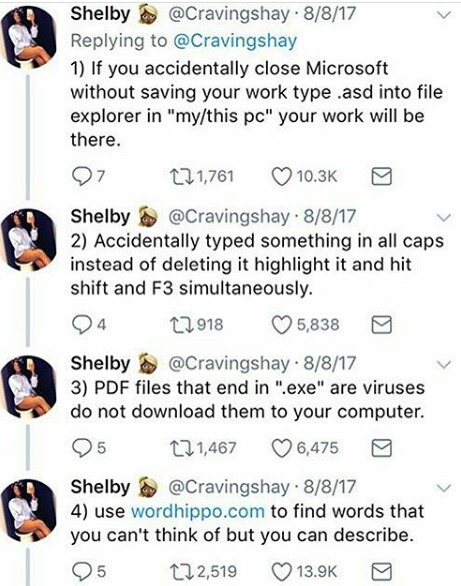
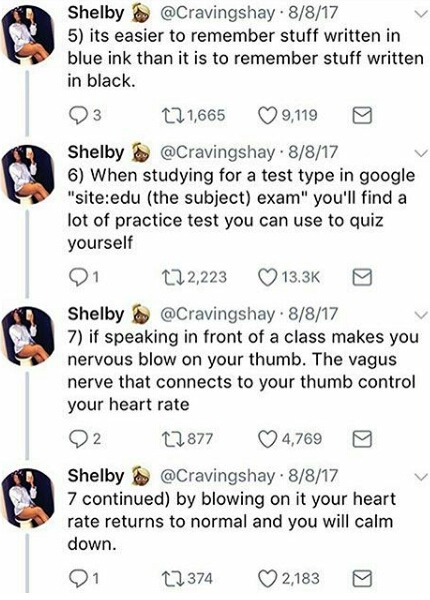
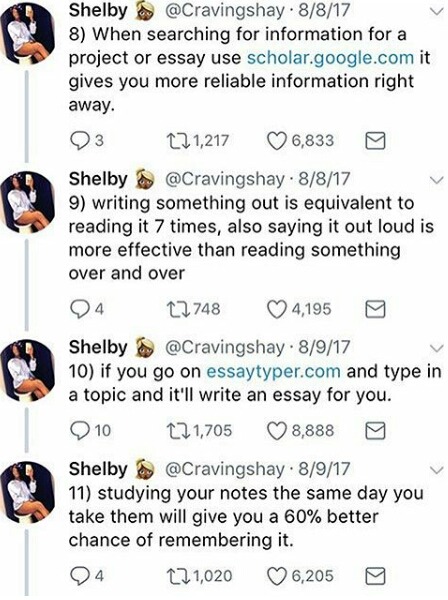
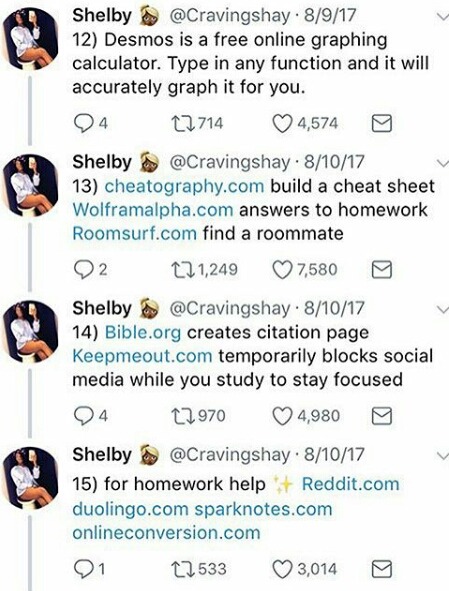
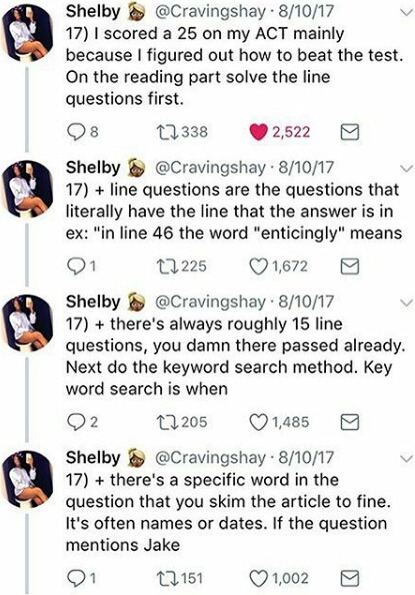
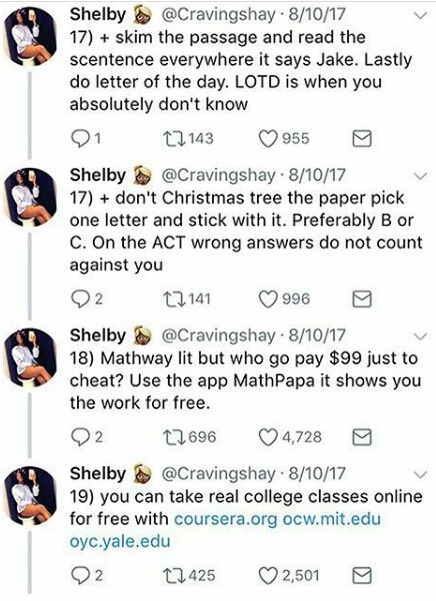
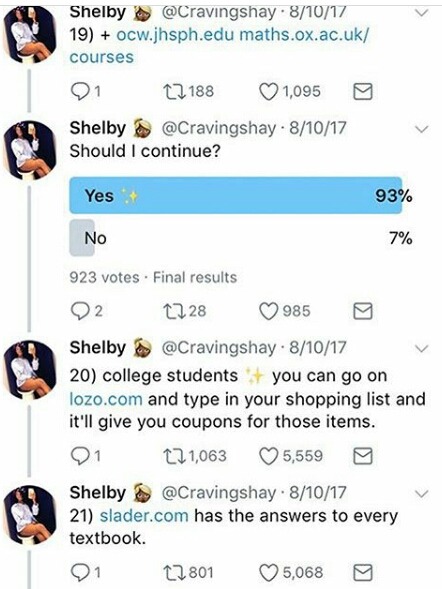
“A Thread of Tips” by Shelby
• #16 is missing but to find out more tips, follow her on twitter; be sure to thank her! 😁
201K notes
·
View notes




